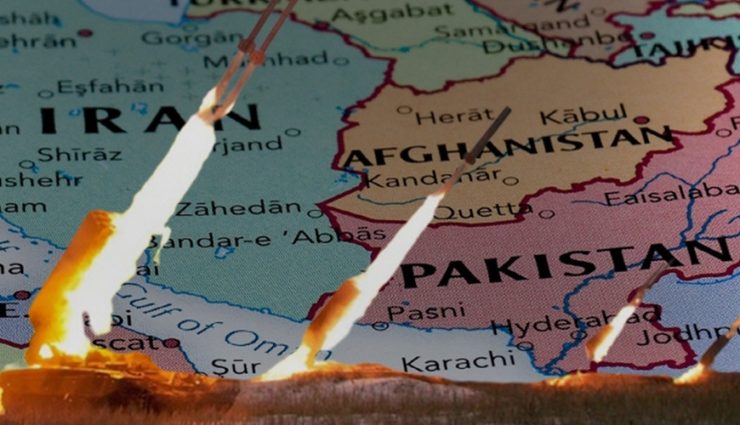
Recently, the world has seen unprecedented tensions between Iran and Pakistan. Both countries have conducted strikes over each other’s territories amidst the surging tensions across the Middle Eastern region and beyond. Iran has conducted strikes over Syria, Iraq, and Pakistan due to multiple factors. However, what caught the world’s attention was Iran’s missile attacks on Pakistan, as the latter is a nuclear power known for its military capabilities.
Pakistan retaliated by attacking 7 sites in Iran’s Baluchestan and Sistan province. Both countries conducted strikes in the name of targeting terrorist groups on each other’s soil. Iran held that it had attacked the bases of Jaish-e-Adl, a militant group operating from Pakistan. However, Pakistani officials refuted these claims and held that two innocent children were killed in these strikes by Iran. On the other hand, Pakistan also claimed that it attacked the bases of the Baloch Liberation Army, a terrorist organization – operating from Iran in Pakistan. These attacks sparked fear of a new war across the region and beyond.
Multiple reasons were at play behind these strikes from both sides. Iran was facing difficulties at the home and international level due to the unfolding regional issues. A blast at Iran’s late General Qassim Soleimani’s grave resulted in the death of almost 100 people. This augmented domestic pressure on the Iranian government to take action against terrorists. Iran blamed Israel for the blast. The former conducted strikes in different neighboring countries to elevate its stature at home. Moreover, Iran is facing immense international pressure due to its alleged backing of Hezbollah and Houthis. Iran is on the hit list of Israel and the United States. Nonetheless, it does not seek direct confrontation with Israel or the United States. Therefore, Iran is required to demonstrate its capabilities and power to its foes. This is also one of the major reasons behind its attacks on the neighboring countries. However, Iran faced a major blow from Pakistan.
The latter’s retaliatory attacks on 7 sites inside Iran exposed its vulnerability. The two key regional players, Russia and China – urged Iran and Pakistan to show restraint. Saudi Arabia and the UAE also urged both countries to resolve the issue diplomatically. But Pakistan, on its hand, had scores of reasons for retaliating militarily against Iran. The country is faced with numerous internal and external challenges. India and Afghanistan are already hostile towards Pakistan. The latter has been involved in border clashes with the Afghan Taliban for the past few months over different issues. India and Pakistan have a historical rivalry. Missile attacks by Iran exposed Pakistan to the rivalry on one more front. India and Afghanistan mocked Pakistan for not responding to Iran’s attack initially.
Pakistan’s government faced great domestic pressure to retaliate against Iran. PTI voters in Pakistan also maligned the country’s establishment for not responding to Iran’s attack effectively. They used the situation to gain political leverage. Pakistan’s army had already been struggling with a hard image inside the country. The military of the country was blamed for meddling in the internal politics of the country. Surging terrorism inside Pakistan has also raised concerns about the performance of the country’s military.
Consequently, Pakistan’s military had no other option but to retaliate to the missile attacks of Iran with much greater force. A lack of retaliation from Pakistan’s military would have exposed the country to numerous menaces. Domestic and regional terrorist organizations would have taken it as a symbol of weakness, which could have resulted in providing impetus to terrorist activities inside the country. Moreover, a weak response by Pakistan would also have encouraged the neighboring rival countries to attack it with much impunity.
Some regional countries, including Russia and China, attempted to de-escalate the situation, considering the sensitivity of the situation. However, the response by the United States depicts that it wanted to procure benefits from the rising tensions between the two countries. Iran has been labeled the top funder of regional terrorism by the United States, following the former’s attacks on Pakistan. Although both countries have demonstrated their willingness to resolve their bilateral issues through dialogue after conducting strikes in each other’s territory, Iran’s foreign minister, reportedly, warned that it would attack again if Pakistan and Iraq did not take its warnings seriously.
Ostensibly, the statement issued by Iran’s foreign ministry seems to reestablish credibility at domestic and international levels. However, it also exposes the region to novel perils by escalating the situation. It augments the prospects of instability and conflicts in the region. A possible conflict between the two countries could augment proxy warfare in the region. Moreover, Israel and the United States could also exploit the clashes between the two countries to fuel instability in the region. Regional terrorist organizations and Pakistan’s other neighboring enemies can also exploit this gulf between it and Iran to achieve their own covert ambitions by leading the two countries into a war. If the two countries go to war with each other, they will have more to lose than to gain at domestic and international levels.
Abbas Hashemite – is a political observer and research analyst for regional and global geopolitical issues. He is currently working as an independent researcher and journalist, exclusively for “New Eastern Outlook”.